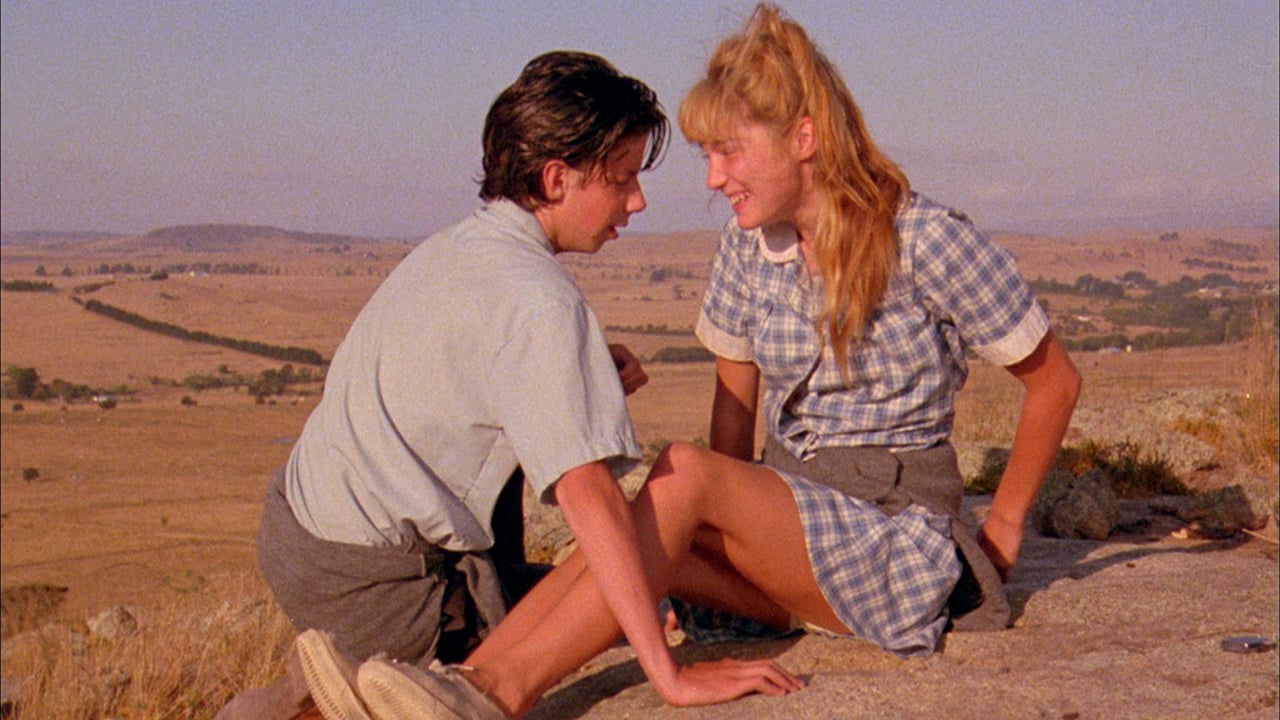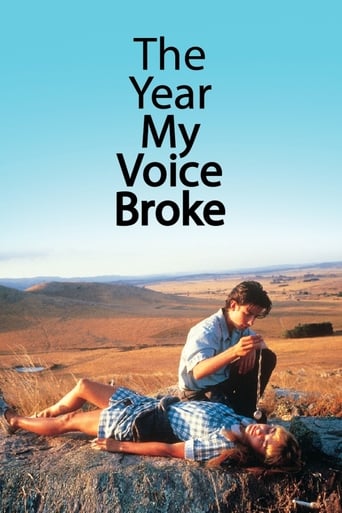robert-temple-1
The talented John Duigan (perhaps best known for directing WIDE SARGASSO SEA (1993), based on the novel by Jean Rhys) wrote and directed this wonderful film about kids growing up in New South Wales, Australia, in 1962. Four years later, with the same boy in the lead, Duigan directed its sequel, FLIRTING (1991). The film is so honest, straightforward, and heart-rending, that it is a model of what an unpretentious film about real people should be. The film was made in the small town of Braidwood, which apart from its cinema looks like something from 1862 rather than 1962, so things clearly didn't change much in those days in the area they call the 'Tableland'. The film would not have worked if the two leads had not been so perfect. Seventeen year-old Loene Carmen is so fresh and real as the girl Freya Olson, but also so convincingly sad and tragic in the light of the events which ensue. The kids in this film just don't seem to be acting. We can almost believe that John Duigan sneaked into the little town with an invisible camera and recorded all of this really happening. The boy Danny is played by Noah Taylor. The honesty and integrity of his performance were the key to its success. He languishes with hopeless love as an onlooker to the tragic first romance of his childhood friend, Freya, who being older than him is 'out of his league' romantically. The pain of first love, especially unrequited first love, is intensely conveyed. There is also the implicit undercurrent that Freya may be his own half-sister, with neither of them realizing it, as there is a subplot about the dead mother of Freya, Sarah Amery, who died having her at the age of only 17, and the father may well have been Danny's own. But this is all the invisible 'grownup background' to the story of the kids, who are in the foreground of this tale. Ben Mendelsohn plays an older boy with a maniacal laugh who steals Freya's heart but who turns out to be mentally unbalanced, presumably with incipient schizophrenic. Things turn out badly. There are wonderful shots of the wild Australia, and the kids run around in the fields and on the hills with the abandon of a youth before everything became spoiled by cell phones, emails, and Facebook. Everyone in those days was outdoors all the time, not hunched over a computer. People actually looked at one another as they passed in the street, and were not peering into their Blackberrys or staring into space with a piece of metal stuck in their ear like a transplant. This film is an ode to real life, in a world which has forgotten what real life is. It is one of the masterpieces of the high tide of Australian cinema back in those days before the tide broke.
Andy (film-critic)
"The Year My Voice Broke" is one of those unknown, quintessential diamond-in-the-rough films that can't seem to find its way into the DVD market, but breaths Criterion throughout the entire viewing. The daring, honest, and descriptive story of a young boy, his love for this older girl, and the tribulations of growing up in a small town are merely scratching the surface to what this film has to offer. It speaks, and pays homage, to those classic films from the late 40s, early 50s by creating a town with character, mythology, and individuality. One could argue that the town in which this film takes place is our fourth character, behind Danny, Freya, and Trevor – but perhaps this enthusiast is getting ahead of himself. Watching this import on a used VHS, the picture was grainy, the player made noise, and the sound was utterly destructive – yet the heart of this film oozed from the screen. The power of the characters, the detail of our story, and the truth in director/screenwriter John Duigan's words went from having meaning in a 1987 film (that was supposed to take place in 1962) to creating a story that didn't feel dated or old watching it today, at the end of 2009. That is the legacy of "The Year My Voice Broke", the raw emotion harassed in this film continues to be relevant today – perhaps even more. As Hollywood uses every CGI possible to recreate the same effect, all one needs to do is look back at films that used the old-fashioned method…great actors, a daring script, and a background that could knock your socks off.To applaud this film, one would need to pat the back of a very young, a very talented, Noah Taylor. Taking on not just an awkward role, he needed to show his anger, his teenage frustration, as well as his headiness for brains instead of brawn. Noah Taylor, known to me as Technical Support in "Vanilla Sky", succeeded gracefully and with the power of most of our top paid American stars. His ability to show us his unconditional love for Freya, his quizzical hatred for Trevor, as well as his sleuthing skills proved that this kid was ready for anything. His co-workers inhabiting each scene worked with his dynamic and equally pushed their talents. Freya, played by Loene Coleman, a newbie to the screen, was enchanting as the love interest. While she wasn't quite the level of Mr. Taylor, her ability to carry her scenes worked. She was the classical bad-girl-next-door with secrets. Her chemistry with Taylor kept me glued to the screen. The same can be said for Trevor, played by Ben Mendelsohn, who's diabolical, nearly irritating, laugh created a character all his own. As the wildcard, we never knew what he was going to do next, and both our characters and our audience were scared of that. To demonstrate the intensity of these actors, watch closely the scene in which they spend the night in the "haunted" house near the railroad tracks. Each one has a motive, each actor/character delivers their emotion, and with each line the scene gets more and more powerful. I wasn't expecting this with children so young.With these three dominate characters; one may ask what else would be needed for an independent film to succeed? One more, the town. As mentioned before, the town that these three (and many others) reside is reminiscent of our American "Bedford Falls". There are residents that have been their all their lives and secrets many of them keep to protect their town. Throughout the film, our characters are continually building their moments via smaller lives within the town. We learn about Danny's passion for the black arts, that Trevor knows the police firsthand, and that Freya's unknown secret keeps the town at bay. Without the closeness of this town, "The Year My Voice Broke" wouldn't have worked. If filmed in a bigger city, the intimate feeling of a protective yet destructive town would have floundered. The town drunk would have been less poignant, Danny's dad's role would have felt less personal, and the idea of home being safe would have felt less comforting. The town had to be a character in this film. Duigan knew it, developed it, and built it strongly into his film.This was a character driven film. Without Noah Taylor, Loene Coleman, or Ben Mendelsohn, this film would have failed. It is hard to imagine anyone else being able to carry these characters, or that an American reality would pack as much of a punch. It was impressive to see Australia in 1962, a place we don't explore in cinema enough over past centuries. Director Duigan, if I haven't already drooled over him enough, understood this film, wrote a genuine story, and built a cinematic triumph. Alas, this film has been forgotten, but look closely at the cinematography, the lavish landscapes, the devotion of our characters, the above mentioned town – these all could not have been accomplished without a passionate eye. I applaud Duigan for his talent and ability to transform this 1980s film into a universally emotional and exciting moment of cinema.Overall, I have said enough. I loved this movie. It was detailed, emotional, and beautiful. Everyone, from director to actors performed superbly. It was a rough couple of prior films, but "The Year My Voice Broke" provided that classic niche. It felt fresh and new, despite the age. I recommend this to everyone. Buy a VHS player and get a copy of this movie, you will not be disappointed.Grade: **** 1/2 out of *****

